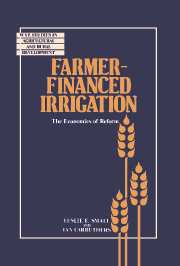Book contents
- Frontmatter
- Contents
- Preface
- 1 Irrigation financing in perspective
- Part I Analysing financing policies: theory and concepts
- Part II Criteria for evaluating irrigation financing policies
- 4 Cost-effective operation and maintenance
- 5 Allocating a scarce resource: water-use efficiency
- 6 Improving investment decisions
- 7 Resource-mobilisation efficiency
- 8 The concern for equity
- Part III Financial autonomy and user fees: key implementation issues
- Notes
- Index
6 - Improving investment decisions
Published online by Cambridge University Press: 05 November 2011
- Frontmatter
- Contents
- Preface
- 1 Irrigation financing in perspective
- Part I Analysing financing policies: theory and concepts
- Part II Criteria for evaluating irrigation financing policies
- 4 Cost-effective operation and maintenance
- 5 Allocating a scarce resource: water-use efficiency
- 6 Improving investment decisions
- 7 Resource-mobilisation efficiency
- 8 The concern for equity
- Part III Financial autonomy and user fees: key implementation issues
- Notes
- Index
Summary
In the previous two chapters we have considered how the financial arrangements for irrigation can affect the performance of existing irrigation systems. Better O&M and more efficient water use can improve irrigation performance, thereby increasing society's overall returns to the resources it has invested in irrigation.
But the problems of low returns to irrigation cannot entirely be addressed by efforts to improve operations. All too often the causes of poor performance can be traced to decisions made when an irrigation project was being planned, designed and constructed. These investment decisions range from design details such as the spacing, size and orientation of the channels, to the fundamental question of whether or not to undertake a proposed project.
As we indicated in Chapter 3, financial arrangements may influence the quality of these decisions. It is our purpose in this chapter to explore in more detail the prospects for using financial policies to improve irrigation investment decisions.
Before proceeding, let us remind the reader of the principal argument that we presented in Chapter 3 regarding this matter. Financial policies can be designed to increase the incentives for those who will eventually operate and use the irrigation system to evaluate the questions that are posed during the planning and design stages. But simply establishing incentives is not enough. Those facing these incentives need also to be given a voice in the decision-making process.
- Type
- Chapter
- Information
- Farmer-Financed IrrigationThe Economics of Reform, pp. 96 - 108Publisher: Cambridge University PressPrint publication year: 1991



